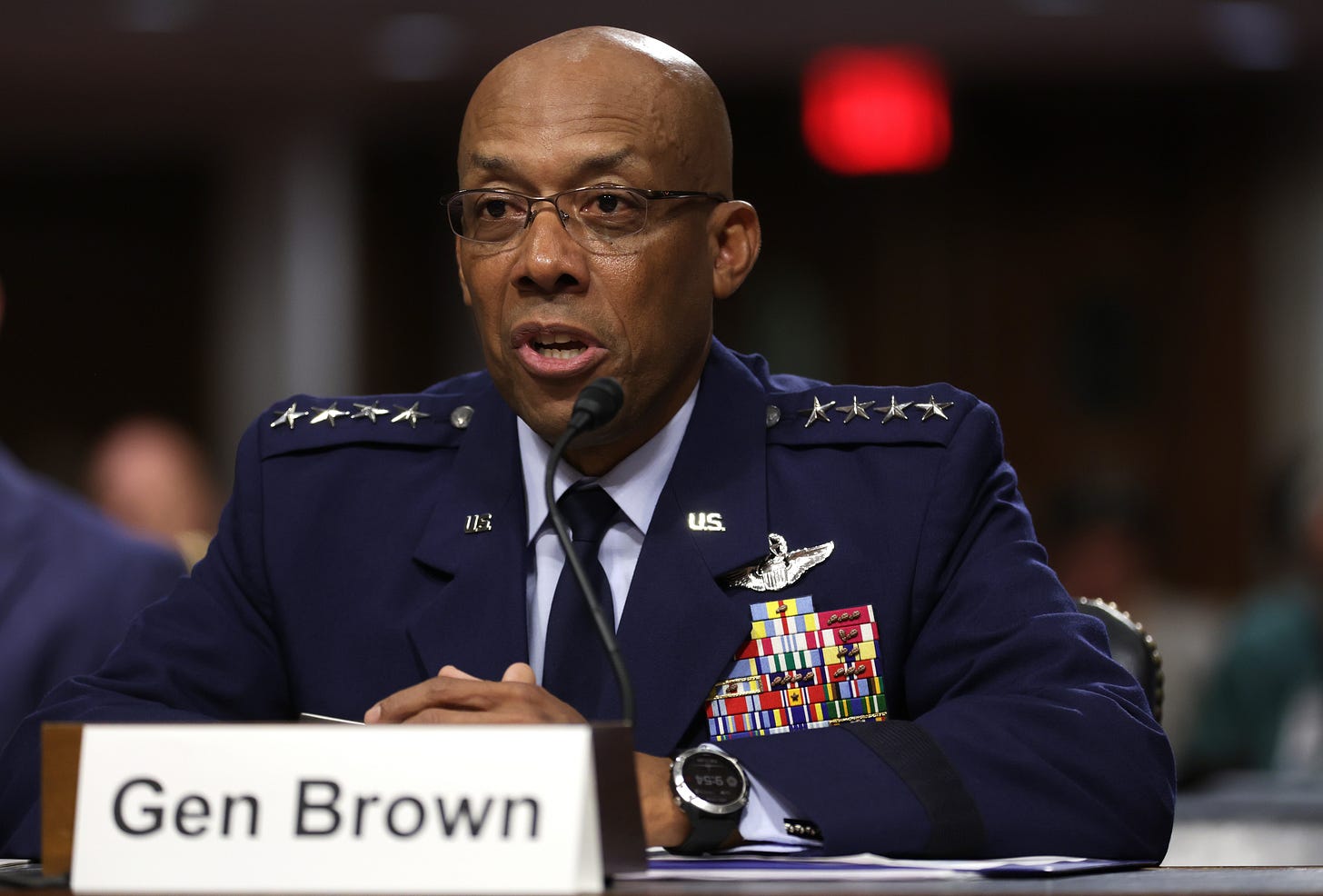THE SENATE ARMED SERVICES COMMITTEE BOMBS
A hearing for the next chairman of the Joint Chiefs of Staff exposes a bipartisan consensus: culture war is a higher priority than debate about the war in Ukraine

Every quote you read in this story can be found in the Senate Armed Services transcript of its hearing on July 11 to consider the nomination of Air Force General Charles Q. Brown, Jr., an esteemed fighter pilot, to be the next chairman of the Joint Chiefs of Staff. He is the first African American to lead a branch of the US Armed Forces, and America has only previously had one black JCS chairman—Colin Powell, who served under President George H.W. Bush—although untold thousands of African Americans have been killed and wounded while fighting for the flag.
Brown’s appointment and the hearing are important because his two predecessors, both four-star generals, were, in their finest moments—I can’t recall more than a handful—little more than mediocre. Confidence in the US Armed Forces plummeted during their chairmanships, as seen in the now chronic inability of most of the services to meet recruiting needs.
There were moments when serious questions were raised and worthy responses made, but those came before the formal hearings, when the professional staff of the Senate committee threw more than 300 written questions to the incoming JCS chairman. Question 54 provides a good sense of the sophisticated tone of most of the queries: “In your view, does the 2022 NDS [National Defense Strategy] accurately assess the current strategic environment, including prioritization among the most critical and enduring threats to the national security of the United States and its allies? Please explain your answer.”
Obviously, General Brown had to depend on his staff and the staff of the JCS to draft his answers, but they were questions he had to assume might be asked during the Senate confirmation hearing. He also had to assume that any of the hundreds of questions might arise during his private meetings with every committee member—a political necessity—before the formal hearing.
The son of an Army colonel and veteran of the Vietnam War, Brown graduated from Texas Tech University and its ROTC program. He rocketed through a series of Air Force assignments as a jet fighter pilot who would fly 3,000 hours, 130 of them in combat. The Air Force recognized early on that he had the right stuff, as he rotated through schools and promotions that put him in leadership roles with the US Central Command, the Air Force headquarters in Europe and the Pacific. He was appointed Air Force chief of staff in 2020.
The committee chairman, Democrat Jack Reed of Rhode Island, a graduate of West Point with two graduate degrees from Harvard who is now in his fifth Senate term, laid out the committee’s bipartisan hard-line point of view—this was not a hearing of the Environment and Public Works committee—at the outset:
“China is our primary competitor. China is the only nation with both the intent and the capability to challenge the interests of the United States and our allies and partners. At the same time, Russia remains a violent, destabilizing force, and nations like Iran and North Korea continue to push the boundaries of military brinksmanship.”
The committee has 25 members, with the Democrats holding a one-seat majority, and the most informed and productive questioning at the hearing came from Reed and his fellow Democrat Elizabeth Warren of Massachusetts and Republicans Roger Wicker of Mississippi and Tom Cotton of Arkansas. It was as if they had read some of the earlier questions and answers prepared by staff that were available to all.
Keep reading with a 7-day free trial
Subscribe to Seymour Hersh to keep reading this post and get 7 days of free access to the full post archives.



